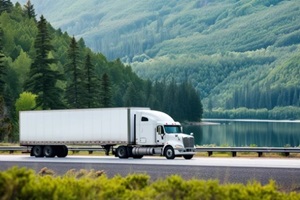
As the owner of a commercial trucking business, you likely have a fleet of vehicles, drivers, and depots that need to be protected against damage and theft. Choosing the right insurance plan is imperative in mitigating risks and avoiding costly claims as your business operates and grows.
This blog explores insurance coverage for commercial trucking businesses, including how to evaluate your business’s coverage needs and customize your policy. Trucking businesses of any size should consider trucking insurance as their first line of defense against liability and costly damages, provided they can pick a policy that meets their needs.
Assessing Your Business Needs
Each business should be assessed for its specific coverage requirements based on its fleet size, driver experience, location, and value. More expensive trucks warrant more comprehensive coverage.
The nature of the cargo should also be a factor in the initial insurance assessment. High-value cargo should raise your internal liability predictions and prompt a more comprehensive insurance plan.
Key Types of Commercial Trucking Insurance
There are three key types of commercial trucking insurance that business owners should be aware of:
General liability insurance: Every state requires commercial trucking companies to have general liability insurance, which protects businesses from liability if their driver causes a crash. These policies cover the bodily and property damage resulting from an employed driver’s actions on the road and on another company’s property, such as at a loading dock or stop.
Physical damage insurance: Physical damage insurance protects trucking businesses from common causes of damage, such as collision, theft, vandalism, and environmental damage. When trucks become damaged beyond repair, physical damage insurance may replace them.
Cargo insurance: Cargo insurance or truck cargo coverage protects against damage or theft to your drivers’ cargo, including pollution cleanup and removal in the event of a hazardous spill.
These are not the only categories of insurance that trucking company owners should be aware of. Primary auto liability coverage is often required by law to protect truck drivers and other drivers on the road from liability for crashes involving your vehicles.
Evaluating Coverage Options
Your state laws will determine the minimum insurance coverage you need, depending on your business model. For example, for trucks weighing over 10,000 pounds, California requires $300,000 of minimum coverage if your business transports household goods, $750,000 if your business transports general freight, and $5 million if your cargo contains hazardous chemicals.

All trucking business owners should compare the policy minimums of their state of operations with their cargo type to find their legal minimum coverage amount. They should then review policy exclusions to protect themselves from loss of coverage during a policy claim.
Cargo that is abandoned, damaged by another business, accepted by the receiving business, transported over a frozen waterway, damaged in a war, or lost due to explosion or contamination is usually excluded from claim coverage.
Considering the Cost
Trucking insurance costs depend on the business’s needs since higher premiums commonly equate to higher-quality coverage. Consider these factors when assessing the policy premiums your business should pay:
- State minimum coverage requirements
- Total value of the vehicles
- Size of the vehicles
- Cargo type and value
- Driver records, including violations
Explore discounts and bundling options to potentially lower premiums, though discounts for commercial trucking businesses are rare. Hiring drivers with a clean driving record and preventing cargo damage are more reliable ways to keep premiums low.
Researching Insurance Providers
When researching insurance plans, start with experienced providers with a reputation for successful payment claims and comprehensive plan options. Search online reviews and prioritize professional recommendations from similar businesses.
Customizing Your Policy
A basic policy may not cover your business for all liabilities. To prevent unexpected fines and damages, ask your provider about the endorsements and riders available to add protection to your policy based on your business’s needs.
For example, you may need passenger coverage if your vehicles often transport nonemployee passengers. Additionally, basic policies may not cover certain hazardous materials, oversized loads, or refrigerated products, requiring additional policy riders.
Seeking Professional Advice
Consulting with an insurance agent or broker can prevent liabilities and uncovered damages by creating a custom policy for your business model. Trucks of different sizes and values warrant varying coverage minimums, which differ by state.
In many cases, basic policies will not cover certain cargo types, warranting a customized policy with the right riders to match your business model. Professional insurance brokers can help trucking business owners avoid seemingly cost-effective plans that lack specific coverage options or plans with high out-of-pocket costs and unreasonable deductibles.
Regular Policy Reviews

Conducting annual policy reviews and updates guarantees that your business still has the coverage it needs as you scale your operations to new objectives. A professional insurance agent can assess your business’s changing needs and find the policy that suits your situation.
Partner with Pro Insurance Group for Your Trucking Insurance Needs
At Pro Insurance Group, our experienced agents have years of expertise in helping commercial trucking businesses find customized insurance solutions that meet the needs of their drivers, vehicles, and cargo. Contact us to schedule a consultation and learn how our professional guidance can match the policy to your business’s changing needs.
